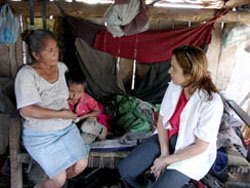Cuban health cooperation benefits poorest hondurans
- Submitted by: admin
- Central America
- International
- Health and Medicine
- 09 / 08 / 2007

The Cuban Medical Brigades that arrived to Honduras on November 3, 1998, after the devastation caused by Hurricane Mitch, have assisted more than 1.6 million people and continue to offer care with a staff of 280 healthcare professionals.
Cuban Ambassador in Tegucigalpa Juan Carlos Hernandez gave details during a press conference about the impact of Cuban cooperation in Honduras from 1999 to the present. He said that Cuban specialists have provided more than 14 million medical consultations, including 6 million to minors under the age of 15; saved 231,994 lives of Honduran citizens since November of 1998; and performed 350,518 operations.
Hernandez noted that in the Honduran communities assisted by Cuban doctors, the infant mortality rate has dropped from the national average of 37 per every 1,000 live births to 10, and that through July of this year the maternal mortality rate has been kept at zero.
Medical doctors and other healthcare professionals from Cuba are providing services in the 18 departments of Honduras, including in the Gracias a Dios region of the Caribbean, where they are providing assistance to the Tawacas indigenous population that are threatened by extinction. He added that along with the Cuban doctors in this region are agronomists, chemistry experts, biologists, cultural specialists and teachers cooperating in the Patuca River area repopulation program.
Provided with this support, the Tawakas have increased their average life expectancy, which was at 40 years in the year 2000, and have reduced nutrition deficiency that affected 92 percent of this population, said Hernandez.
The Cuban diplomat also added that teachers are now implementing the Yes I Can literacy program in the department of Lempira populated by the Lenca indigenous group in a deplorable state of poor nutrition and illiteracy.
More than 1,000 young Hondurans, in their great majority from low income families, are studying in Cuba under the scholarship program at the Latin American School of Medicine based in Havana. Nearly 500 have already graduated as medical doctors.
Source: Granma
Cuban Ambassador in Tegucigalpa Juan Carlos Hernandez gave details during a press conference about the impact of Cuban cooperation in Honduras from 1999 to the present. He said that Cuban specialists have provided more than 14 million medical consultations, including 6 million to minors under the age of 15; saved 231,994 lives of Honduran citizens since November of 1998; and performed 350,518 operations.
Hernandez noted that in the Honduran communities assisted by Cuban doctors, the infant mortality rate has dropped from the national average of 37 per every 1,000 live births to 10, and that through July of this year the maternal mortality rate has been kept at zero.
Medical doctors and other healthcare professionals from Cuba are providing services in the 18 departments of Honduras, including in the Gracias a Dios region of the Caribbean, where they are providing assistance to the Tawacas indigenous population that are threatened by extinction. He added that along with the Cuban doctors in this region are agronomists, chemistry experts, biologists, cultural specialists and teachers cooperating in the Patuca River area repopulation program.
Provided with this support, the Tawakas have increased their average life expectancy, which was at 40 years in the year 2000, and have reduced nutrition deficiency that affected 92 percent of this population, said Hernandez.
The Cuban diplomat also added that teachers are now implementing the Yes I Can literacy program in the department of Lempira populated by the Lenca indigenous group in a deplorable state of poor nutrition and illiteracy.
More than 1,000 young Hondurans, in their great majority from low income families, are studying in Cuba under the scholarship program at the Latin American School of Medicine based in Havana. Nearly 500 have already graduated as medical doctors.
Source: Granma
Comments